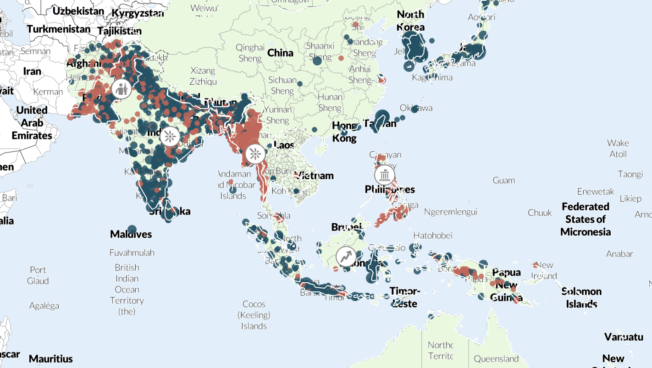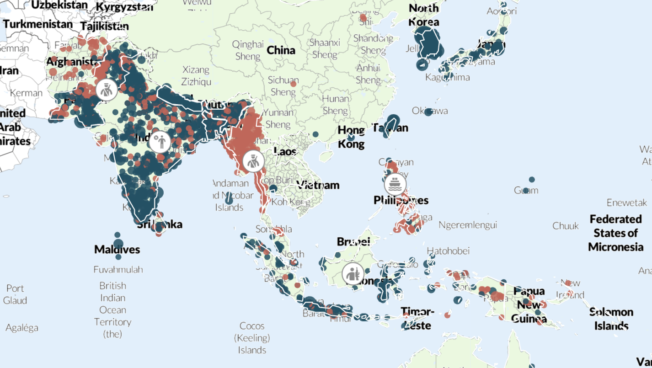Regional Overview
Asia-Pacific
March 2024
Posted: 8 April 2024
 Afghanistan: IS carries out deadly attack in Kandahar
Afghanistan: IS carries out deadly attack in Kandahar
On 21 March, a suicide bomber allegedly affiliated with the Islamic State Khorasan Province (ISKP) detonated himself outside a bank in Kandahar city, killing at least 21 people, including members of the Taliban. The bombing seemed to target Taliban members specifically, detonating as they gathered to withdraw their salaries. This was the first such ISKP bombing in more than a month and the deadliest IS attack targeting Taliban members since November 2021, shortly after the Taliban came to power. The attack came during a period in which ISKP has gained increasing prominence for its activities beyond Afghanistan’s borders, including attacks in Iran and, most recently, the branch has reportedly been affiliated with the 22 March 2024 attack on a Moscow concert hall.1Tim Lister, ‘How ISIS has Europe and the US in sights after deadly Moscow attack,’ CNN, 31 March 2024
 Indonesia: Electoral and military violence increases tensions in Papua
Indonesia: Electoral and military violence increases tensions in Papua
Election-related demonstrations and violence remained steady in Papua in March despite nationwide events halving compared to the previous month. Election-related disorder centered on the release of results from the 14 February election. In Highland Papua, the rejection of election results led to fighting, resulting in at least four people injured. In Wamena, locals damaged the General Election Commission building and assaulted a commissioner. Armed Papuans scuffled with Indonesian police forces, resulting in the arrest of 14 people. Meanwhile, thousands of protesters in Jayawijaya2Arni Hisage, ‘Thousands of people from 40 districts raided the General Election Commission building in Jayawijaya, Muin Asso: Reject the election result,’ Tribunnews, 15 March 2024 and Merauke3Emanuel Riberu, ‘Thousands of indigenous South Papuans took to the streets demanding political rights in the 2024 elections,’ Jubi, 12 March 2024 demanded an investigation of electoral fraud.
Amidst the electoral disputes, the spread of a video of military officers torturing a Papuan civilian triggered protests in late March. The clip showed a Papuan sitting in a container filled with water and blood, repeatedly beaten and stabbed with a knife by the officers.4Human Rights Monitor,’Videos of Indonesian soldiers torturing Papuan go viral – Human rights defenders demand judicial process against perpetrators,’ 22 March 2024 According to local NGOs, the torture was in retaliation to the arson attack by the West Papua National Liberation Army (TPNPB) in early February.5Pizaro Gozali Idrus, ‘TNI detains 13 soldiers suspected of torturing Papuan civilians,’ BenarNews, 25 March 2024 Soldiers also reportedly tortured two other civilians. One of the victims died, while two others were released and taken to a hospital by their families.6Yulianus Degei, ‘TNI Soldiers Tortured Puncak Residents: Papuan Students Call for Simultaneous Action in Java, Bali and Sumatra,’ Tribunnews, 28 March 2024; Brigitta Belia Permata Sari, ‘TNI: KKB member Definus Kogoya has been treated and sent home,’ Detik, 25 March 2024 In response to ongoing TPNPB activity, President-elect Prabowo Subianto had pledged to increase military presence in Papua during his campaign.7Rizka Khaerunnisa, ‘Prabowo reveals strategy for resolving human rights problems in Papua,’ Antara News, 12 December 2023 A former army general during the Suharto dictatorship, Prabowo has referred to the TPNPB as a “terrorist” group.8Zefanya Aprilia, ‘Prabowo: Papua’s problem is complicated due to foreign interference,’ CNBC Indonesia, 12 December 2023
 India: The BJP government cracks down on the opposition ahead of elections
India: The BJP government cracks down on the opposition ahead of elections
On 21 March 2024, the Indian National Congress (INC), India’s main opposition party, accused the Income Tax Department of freezing its bank accounts in connection with a tax dispute dating back to the 1990s.9Al Jazeera, ‘Congress party accuses government of account freezing before India election,’ 21 March 2024 Hours later, the Enforcement Directorate of India, an agency overseeing economic crimes, arrested the Delhi chief minister and national convenor of the Aam Aadmi Party (AAP), Arvind Kejriwal, in connection with a corruption case.10BBC, ‘Arvind Kejriwal: Delhi chief minister remanded to custody in corruption case,’ 22 March 2024 The punitive actions came weeks after the Supreme Court struck down a political party-funding scheme using electoral bonds as unconstitutional; the ruling Bharatiya Janata Party (BJP) was the biggest beneficiary of this scheme.11Hannah Ellis-Petersen, ‘Narendra Modi’s BJP given £570m under scheme allowing anonymous donations,’ The Guardian, 15 March 2024 Both the INC and AAP are a part of the Indian National Developmental Inclusive Alliance (INDIA), a broad-church coalition of over 20 opposition parties that have rallied together to challenge the BJP in the upcoming general elections, scheduled to begin on 19 April.
The AAP and INC, among other opposition parties, took to the streets across India against what they called the BJP’s “political vendetta” and demanded compliance with the Supreme Court’s judgment on transparency in political funding.12Indian Express, ‘Congress accuses BJP government of “tax terror attack”: “attempt to financially cripple us”, 23 February 2024; The Economic Times, ‘If President’s Rule imposed in Delhi, it would be clear case of political vendetta, says AAP’s Atishi,’ 27 March 2024 ACLED records around 500 demonstrations by INDIA bloc members in March, a near doubling of such events from the month prior. They alleged that the regulatory actions against them were taken at the behest of the BJP government to impede their campaigning activities ahead of the elections. India’s opposition parties have long blamed the government for misusing federal agencies to target opposition politicians.13Bharti Jain, ‘Opposition MPs in Rajya Sabha target government over “misuse” of central agencies,’ Times of India, 6 February 2024 The United Nations Human Rights Commissioner recently expressed concern over “increasing restrictions on the civic space” in India ahead of the elections.14United Nations Human Rights, ‘Türk’s global update to the Human Rights Council,’ 4 March 2024
 Myanmar: Battlefront reopened in Kachin state
Myanmar: Battlefront reopened in Kachin state
On 7 March, the Kachin Independence Organization/Kachin Independence Army (KIO/KIA) opened a battlefront in Kachin state with simultaneous attacks against military outposts and bases threatening Laiza, the KIO/KIA’s headquarters on the border with China.15Kachin News Group, KIA launches simultaneous attacks on multiple Burma army camps, 07 March 2024 Locally known as Operation 0307, the KIO/KIA and its allied resistance forces successfully captured more than 40 military outposts and strategic bases by the end of the month. The military suffered major casualties during a 10-day battle in Tar Ma Hkan village of Hpakant township and lost control of Lewgel, a significant town for trade with China, to the KIO/KIA. The military used heavy airstrikes and artillery shells during clashes, often targeting civilian areas. ACLED records an increase in violence targeting civilians in Kachin state to 26 events in March, from 18 the month prior.
 Philippines: BIFF and state forces clash during Ramadan
Philippines: BIFF and state forces clash during Ramadan
In March, the Bangsamoro Islamic Freedom Fighters (BIFF) carried out several attacks on state forces following several months of inactivity. On 17 March, BIFF militants killed four government soldiers in an ambush in Datu Hoffer town, Maguindanao del Sur, Bangsamoro Autonomous Region in Muslim Mindanao (BARMM), after wounding two soldiers in a separate offensive in Datu Salibo town a day earlier. The Karialan faction of BIFF claimed responsibility for the attacks and threatened more, claiming that it is retaliating against consecutive military offensives that killed relatives of a BIFF leader during Ramadan.16Rommel Rebollido, ‘BIFF warns of more attacks after Maguindanao del Sur ambush,’ Rappler, 19 March 2024 The BIFF faction and state forces clashed anew in Datu Saudi Ampatuan town on 22 March, leaving a BIFF training officer dead. The BIFF offensives highlight the persistence of security issues in the region about a year before the first-ever parliamentary elections in BARMM, to be held in May 2025 in fulfillment of the 2014 peace agreement between the formerly separatist Moro Islamic Liberation Front (MILF) and the national government. BIFF broke away from the MILF in 2010 in opposition to the new round of peace negotiations that later led to the 2014 peace deal.17International Crisis Group, ‘The Philippines: Militancy and the New Bangsamoro,’ 27 June 2019
 Thailand: Arson attacks and escalating violence after peace talk
Thailand: Arson attacks and escalating violence after peace talk
On 22 March, a coordinated series of arson attacks spanned across the Deep South, orchestrated by Malay Muslim separatists and targeting over 40 locations. The attacks, which occurred on the anniversary of the 2004 Tak Bai tragedy — when 78 demonstrators suffocated while being transported under police detention — left one individual dead and several others injured. Authorities assert that these fire attacks are aimed at destabilizing the local economy, undermining confidence in security forces, and fostering unrest during the Muslim holy month of Ramadan. This surge in violence also followed a confrontation on 14 March, wherein Malay Muslim separatists clashed with officials during a house search in Pattani. The skirmish resulted in the deaths of two separatists after a prolonged exchange of gunfire spanning over half an hour. The escalation in violence occurred in the wake of peace negotiations held on 6 to 7 February in Kuala Lumpur between the Thai government and the Barisan Revolusi Nasional (BRN), the primary insurgent entity in the Deep South. The dialogue contributed to the refinement and strengthening of the Joint Comprehensive Plan Toward Peace, with a focus on fostering a ceasefire during the Ramadan period.18Benar News, ‘Thailand, BRN rebels discuss easing tensions ahead of Ramadan, Songkran,’ 7 February 2024 However, despite the civilian administration’s efforts, military influence continues to wield considerable authority in the Deep South, with the Internal Security Operations Command retaining augmented powers since the 2006 and 2014 military coups.19Nikkei, ‘Talks alone will not bring lasting peace to Thailand’s deep south,’ 3 April 2024
See More
See the Codebook and the User Guide for an overview of ACLED’s core methodology. For additional documentation, check the Resource Library. Region-specific methodology briefs can be accessed below.
Links:
- Methodology and Coding Decisions for Political Violence and Demonstrations in Afghanistan
- Methodology and Coding Decisions for Political Violence and Demonstrations in China
- Methodology and Coding Decisions for Political Violence and Demonstrations in Myanmar
- Methodology and Coding Decisions for Political Violence and Demonstrations in North Korea
- Methodology and Coding Decisions for the Philippines Drug War







